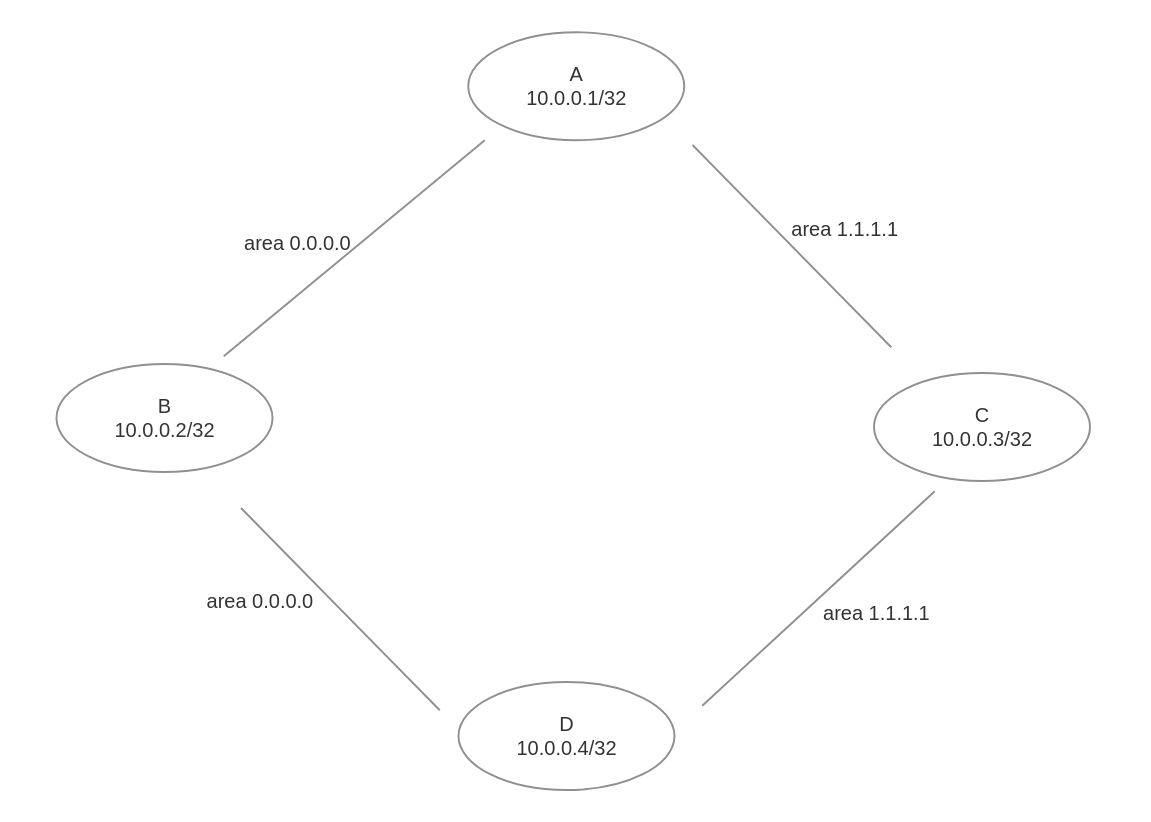After link failure, router A does receive updates about 10.0.0.4/32 from router C, but does not insert them in routing table.
#------------------------LINK A to B working
2025-03-17 12:56:39 route,ospf,debug ospf-instance-1 { version: 2 router-id: 10.0.0.1 } backbone { 0.0.0.0 } lsa { router originator: 10.0.0.4 id: 10.0.0.4 seq: 0x8000015b csum: 0xb586 } received refresh
2025-03-17 12:56:39 route,ospf,debug ospf-instance-1 { version: 2 router-id: 10.0.0.1 } backbone { 0.0.0.0 } lsa { router originator: 10.0.0.4 id: 10.0.0.4 seq: 0x8000015c csum: 0xb387 } schedule decay age: 3598
2025-03-17 12:56:39 route,ospf,debug ospf-instance-1 { version: 2 router-id: 10.0.0.1 } backbone { 0.0.0.0 } lsa { router originator: 10.0.0.4 id: 10.0.0.4 seq: 0x8000015c csum: 0xb387 } flooding
2025-03-17 13:11:45 route,ospf,debug ospf-instance-1 { version: 2 router-id: 10.0.0.1 } test { 1.1.1.1 } lsa { router originator: 10.0.0.4 id: 10.0.0.4 seq: 0x80000145 csum: 0x173c } received refresh
2025-03-17 13:11:45 route,ospf,debug ospf-instance-1 { version: 2 router-id: 10.0.0.1 } test { 1.1.1.1 } lsa { router originator: 10.0.0.4 id: 10.0.0.4 seq: 0x80000146 csum: 0x153d } schedule decay age: 3598
2025-03-17 13:11:45 route,ospf,debug ospf-instance-1 { version: 2 router-id: 10.0.0.1 } test { 1.1.1.1 } lsa { router originator: 10.0.0.4 id: 10.0.0.4 seq: 0x80000146 csum: 0x153d } flooding
2025-03-17 13:12:23 route,ospf,debug ospf-instance-1 { version: 2 router-id: 10.0.0.1 } backbone { 0.0.0.0 } lsa { inter-area-router originator: 10.0.0.1 id: 10.0.0.4 seq: 0x80000002 csum: 0x64db } flooding
2025-03-17 13:14:07 route,ospf,debug ospf-instance-1 { version: 2 router-id: 10.0.0.1 } test { 1.1.1.1 } lsa { inter-area-prefix originator: 10.0.0.1 id: 10.0.0.4 seq: 0x80000002 csum: 0x7cc3 } flooding
2025-03-17 13:15:10 route,ospf,debug ospf-instance-1 { version: 2 router-id: 10.0.0.1 } test { 1.1.1.1 } lsa { inter-area-router originator: 10.0.0.4 id: 10.0.0.4 seq: 0x80000001 csum: 0x68d3 } received refresh
2025-03-17 13:15:10 route,ospf,debug ospf-instance-1 { version: 2 router-id: 10.0.0.1 } test { 1.1.1.1 } lsa { inter-area-router originator: 10.0.0.4 id: 10.0.0.4 seq: 0x80000002 csum: 0x66d4 } schedule decay age: 3598
2025-03-17 13:15:10 route,ospf,debug ospf-instance-1 { version: 2 router-id: 10.0.0.1 } test { 1.1.1.1 } lsa { inter-area-router originator: 10.0.0.4 id: 10.0.0.4 seq: 0x80000002 csum: 0x66d4 } flooding
#------------------------Failure of link from A to B occured here
2025-03-17 13:16:00 route,ospf,debug ospf-instance-1 { version: 2 router-id: 10.0.0.1 } test { 1.1.1.1 } lsa { inter-area-prefix originator: 10.0.0.1 id: 10.0.0.4 seq: 0x80000002 csum: 0x7cc3 } originator flush
2025-03-17 13:16:00 route,ospf,debug ospf-instance-1 { version: 2 router-id: 10.0.0.1 } test { 1.1.1.1 } lsa { inter-area-prefix originator: 10.0.0.1 id: 10.0.0.4 seq: 0x80000002 csum: 0x7cc3 flushing } flooding
2025-03-17 13:16:00 route,ospf,debug ospf-instance-1 { version: 2 router-id: 10.0.0.1 } test { 1.1.1.1 } lsa { inter-area-router originator: 10.0.0.4 id: 10.0.0.4 seq: 0x80000002 csum: 0x66d4 } received flush
2025-03-17 13:16:00 route,ospf,debug ospf-instance-1 { version: 2 router-id: 10.0.0.1 } test { 1.1.1.1 } lsa { inter-area-router originator: 10.0.0.4 id: 10.0.0.4 seq: 0x80000002 csum: 0x66d4 flushing } flooding
2025-03-17 13:18:34 route,ospf,debug ospf-instance-1 { version: 2 router-id: 10.0.0.1 } test { 1.1.1.1 } lsa { inter-area-prefix originator: 10.0.0.4 id: 10.0.0.4 seq: 0x800000ec csum: 0x80d3 } received refresh
2025-03-17 13:18:34 route,ospf,debug ospf-instance-1 { version: 2 router-id: 10.0.0.1 } test { 1.1.1.1 } lsa { inter-area-prefix originator: 10.0.0.4 id: 10.0.0.4 seq: 0x800000ed csum: 0x7ed4 } schedule decay age: 3598
2025-03-17 13:18:34 route,ospf,debug ospf-instance-1 { version: 2 router-id: 10.0.0.1 } test { 1.1.1.1 } lsa { inter-area-prefix originator: 10.0.0.4 id: 10.0.0.4 seq: 0x800000ed csum: 0x7ed4 } flooding
 . Every router runs 7.18.2
. Every router runs 7.18.2

